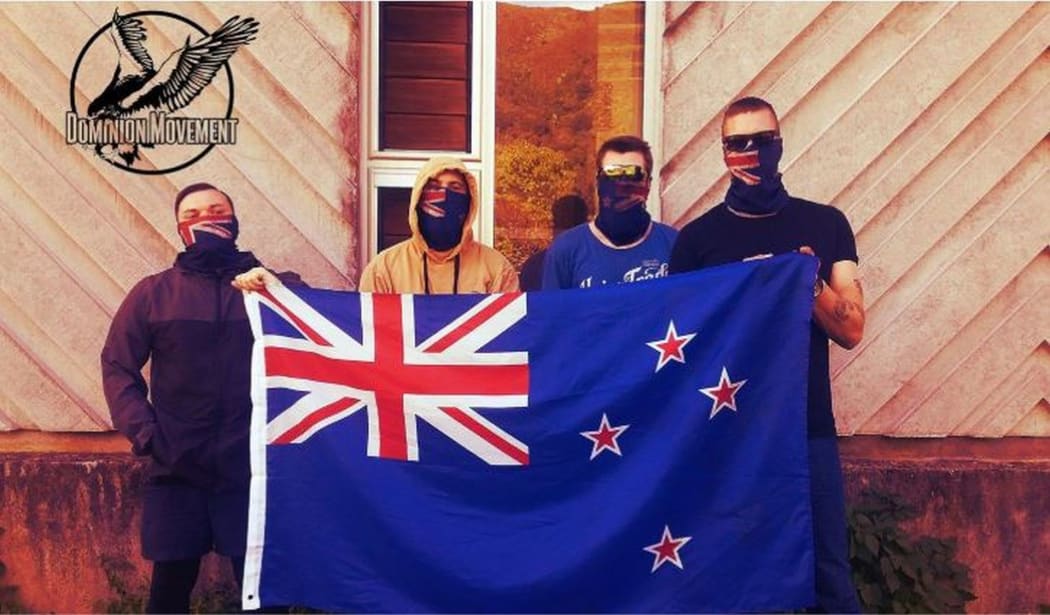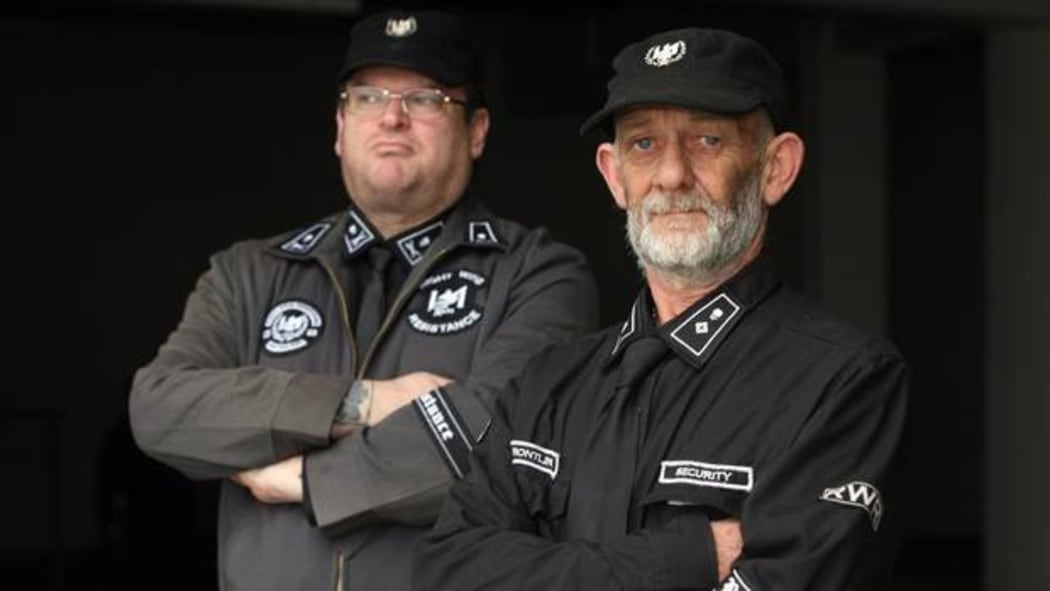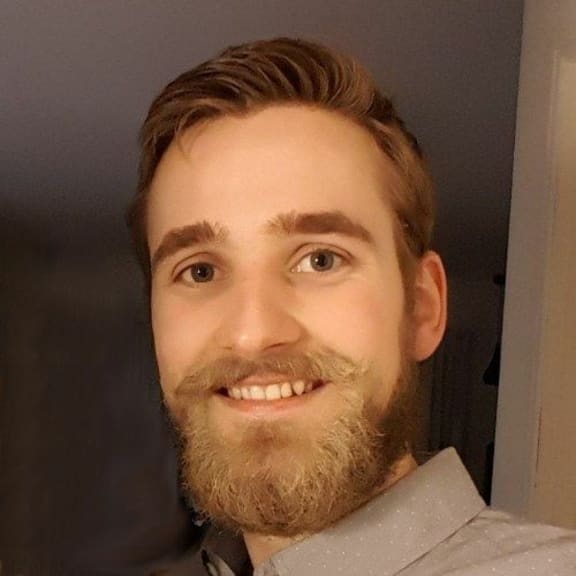Insight - As the government looks to build international action to counter hate speech and extremism on social media, far-right political groups and ideologies are growing and becoming harder to detect. Gyles Beckford has been investigating the emergence of new groups and new causes that are attracting disaffected and disengaged people.
It used to seem easy to spot the far-right in New Zealand: the skin heads, the neo-Nazis, the anti-semitics dressed in black with an attachment to Nazi-style clothing, flags, symbols and little political philosophy.

The Dominion Movement has retreated from public view since the March 15 terror attacks in Christchurch, but experts warn the ideologies and politics are still there. Photo: Facebook
The National Front was one of the most prominent of the old right, standing out but dismissed as largely ineffective apart from random acts of violence and vandalism.
Kyle Chapman - a leading figure in the National front who admitted to bombing a marae in Invercargill - described many of its members as being more influenced by drugs and alcohol than real ideology.
"They're the old right, where everything they do is based around sort of more of a gang thing than actual politics."
Read more:
When they gathered publicly to push their "white is right" message, they numbered only dozens and often attracted much bigger counter demonstrations.
Another of the old style far right groups was the Right Wing Resistance - a group Kyle Chapman was also associated with before he had a falling out with them. They wore black paramilitary uniforms, military-style ranks and Nazi regalia, and campaigned against "anti-white racism" and Asian immigration.
Like the National Front, it has now disbanded.

Kyle Chapman (left) and Vaughan Tocker of the Right Wing Resistance Movement. Mr Chapman left after a falling out with the group. Photo: RNZ /SUPPLIED
The old has been replaced by the new, however. The SS-style uniforms and neo-Nazi regalia are out, dress shirts, jeans and sweaters are in.
Insight is on Apple Podcasts: subscribe and give us a review - Or head to Spotify or wherever you get your podcasts
New breeds and brands of the far-right have emerged in the past decade with a pick and mix of political causes and ideologies: anti-Islam, white supremacy, anti-immigration, and the current populist tag "identitarianism": the belief that social, ethnic and cultural identity matters above all.
Professor Paul Spoonley of Massey University has long tracked the evolution of the far right in New Zealand, and says the new movements have changed in thought and deed, even dress.
"They're much more sophisticated in terms of using technology, they're much more internationally connected so they're hooked into that international network of far right groups around the world.
"They do present slightly differently when they come together and ... a part of the far-right - particularly part of the alt-right - has made an attempt to infiltrate politics and political parties by being much better presented, being in terms of their dress much more like the mainstream but then bringing those ideas, those far-right ideas, into politics."
Anjum Rahman is a spokesperson for the Islamic Women's Council (IWC) which has repeatedly lobbied New Zealand's security agencies to do more about the far right in New Zealand.
"We believe there has been a lot of rise in negativity and this was stuff we could see online that was available," she said.
"We also know there's a lot of activity in the dark web that's going on ... I think we need to be as concerned and use exactly the same tools that have been used to monitor ISIS. That same level of scrutiny needs to go on these extreme groups that are espousing violence, extreme hate."
She said the IWC had met with the SIS in 2016 and 2017 over threats and what the IWC perceived as a general rise in such hate speech.
"Our first meeting was set up at the instigation of [SIS director] Rebecca Kitteridge and her concern around the Jihadi bride incident and her wish to apologise for that. So we took the opportunity to raise a range of issues.
"We did have examples of, say, a Facebook group where there were messages to 'kill all Muslims' but we didn't have specific knowledge of a specific person or incident and that's where it was difficult ... we were not specific in 2016 but certainly, in March 2017 meeting, we were much more specific."
She said her colleage Aliya Danzeisen certainly raised their concerns at a security conference in May 2018.
"We have been specific in saying that we expected our agencies to be paying attention to the rise of the alt-right in New Zealand," Ms Rahman said. "We generally expressed our concern and we expected that concern to be taken seriously.
"As to the response I have no idea what was done after that."
Such groups have emerged in social media or internet chatrooms such as 4chan, 8 chan, Stormfront and GAB, often dominated by young white men who say they feel politically and financially disenfranchised.
The Western Guard group advertised for members who were "physically fit, presentable, and were not homosexuals, transsexuals" and had posters saying "only white men" could "prevent white genocide". The European Students Association promoted the virtues of European culture, and the Dominion Movement called itself a fraternity of young New Zealand nationalists giving white people a voice.
In each case they have disappeared from view once public and media scrutiny intensified - the Dominion Movement shut its website hours after the mosque shootings.
Attempts to contact representatives of these groups were rejected or ignored.
One local group which espouses this new shade of conservatism is Right Minds, which has been prominent in the campaign against the UN Migration agreement and in support of free speech - particularly for the Canadian far-right activists Lauren Southern and Stefan Molyneux.

Dieuwe de Boer Photo: Facebook
Its public face is Dieuwe de Boer, who rejects the "alt-right" label and declined to be interviewed too, saying he would only speaking on alternative-media platforms.
On the Australian-based Unshackled website, he spoke of the dangers of mass migration around the world.
"It's not about being against immigration in general but about having people who will want to fit in, who will want to integrate and will want to participate in our society without turning it into the society that they left for a reason.
"So it is a continuing worry or something to keep an eye on."
Prof Spoonley said the political, public and media scrutiny in the wake of the mosque shootings may have sent many of the groups underground, but they have not gone away.
"The activists and the politics never disappear, and so one of the things I would really strongly caution fellow New Zealanders about is that [idea that] because they've gone quiet they have somehow retreated or disappeared. They will come back, of that I am certain."
The challenge now for authorities is to manage its familiar alertness for so-called Jihadi attacks and develop new strategies to tackle potential domestic threats.
Former United States FBI agent Ali Soufan warns that political and security groups in Western countries have been so focused on Islamic and so-called jihadi terrorism that they have ignored a greater and growing threat.
He said the growth of white nationalism and far-right violence has become international, driven by the internet and social media, and it was time for an international response.
"The rise of this movement is connected to the rise of ultranationalist politics across Europe and even here in the United States," he said.
"If you look at the countries around Europe you see that there is an overlap between right-wing extermism and between nationalistic politics. Far-right parties have made significant gains in many western Europern countries.
"At the same time after 9/11, our whole intelligence appararatus to focus on terrorist networks around the world is basically built and tailored to focus on the jihadis, not on other groups. And, you know, I don't think intelligence agencies or law enforcement agencies have the legal authority to focus on domestic terror groups in the same way that they focus on foreign terror organisations.
"We don't have a political agreement on coming up with a stategy to counter the kind of threats posed by these kind of hate groups. It becomes a political issue domestically and as it is in so many countries around western Europe.
"That legal authority makes it a little bit complicated to monitor and collect on right-wing extremists the same way we collect and we monitor Islamic Jihadists."
Mr Soufan said it was time for authorities to tackle the internet and social media to counter the growing threat from all extremists.
"I think the social media companies can do more and more, but also this is a very complicated subject and I think social media companies can sometimes be limited in how they monitor and how they control their own platforms.
"Definitely we need to pay attention to hate speech on these platforms because it's creating a lot of chaos and divisions, and it's actually recruiting people who have identity issues.
"These groups - the Islamists or the neo-Nazis or the white supremacists - are coming to these individuals and saying 'you know, we can give you the solution, we can show you a world that you didn't know exists' and unfortunately that's going to create a lot of instability down the road. We need to monitor it, we need to have a discussion about this, we need to come up with a strategy.
"What we've seen in Christchurch I think is, unfortunately, only the beginning."


